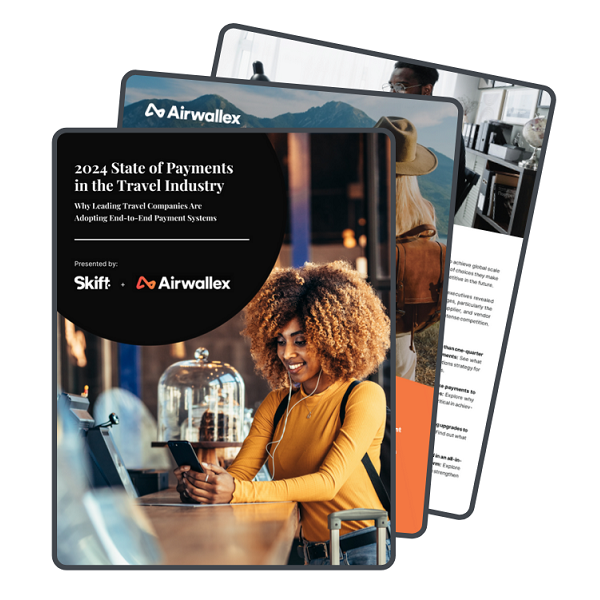
New research reveals 67% of Australian travel companies see their profit margins eroded by inefficient payment systems
New research has revealed that 67 percent of Australian travel companies are seeing their profit margins impacted by outdated or complicated payment systems, with 91 percent expected to prioritise modernising their financial operations this year.
In a report released today by leading global payments and financial platform, Airwallex, and travel research company, Skift, the travel industry is also being challenged by shifting payment preferences since the COVID-19 pandemic. While revenue from cross-border payments is on the rise, the unprecedented diversity of payment methods in different markets is complicating transactions for 79 per cent of companies in Australia.
Commenting on the research findings Jack Zhang, Co-Founder and CEO at Airwallex, said, “As global travel continues to boom, online travel agents increasingly must rely on quick and seamless cross-border payments to surpass customer expectations at every touchpoint. However, our latest study shows that slow and outdated payment processes are increasing the cost of moving money internationally, which is eating into their profits, which are modest at the best of times.
“Modernising their financial operations with a unified and scalable payment solution will be critical to reduce the cost and friction associated with cross-border transactions. For smaller players especially, this can be what levels the playing field, enabling them to compete with their larger, more established counterparts.”
Skift and Airwallex surveyed 473 travel executives in April 2024 across seven global markets — Australia, China, Hong Kong SAR, Israel, Singapore, the United Kingdom, and the United States. The survey respondents confirmed that they make decisions about payment processes and financial operations for a travel company across the sector including online travel booking, travel operators, tours and activities, and destination management.
The findings provide a unique perspective on the financial challenges and opportunities that companies face as they grow and operate on a global scale. It offers rare insight into the issues travel businesses come across with end-to-end payments and financial operations, especially with the growing trend of cross-border transactions.
KEY FINDINGS
Travel customer payment preferences are shifting with local payment methods being increasingly used
Credit cards, debit cards and digital wallets remain by far the most common customer payment methods. However, travellers are increasingly using local payment methods or peer-to-peer payment apps, which can vary widely by market.
- Traditional payment methods like cash and cheques are still in use by 33 percent of travel companies in Australia, despite a move towards digital payments.
- 88 percent of Australian travel executives agreed that there has been a shift in how customers prefer to pay since the Covid-19 pandemic.
- Local payment methods and peer-to-peer systems are also rapidly gaining popularity, especially in Asia. In Australia, though, peer-to-peer systems have yet to gain traction, with just 14 percent of travel executives reporting that customers use them often.
- A majority (88 percent) of travel executives in Australia use direct bank transfers or wire transfers to pay travel vendors and suppliers, even though more than 50 percent agree that they face issues such as lengthy processing times and fluctuating exchange rates.
Cross-border transactions soar, but bring significant global payment challenges
Cross-border transactions are now commonplace with nearly 80 percent of travel executives reporting more than a quarter of their revenues to be from international customer payments. Meeting different market payment needs, FX fees, and managing multiple supplier and vendor payments in multiple countries hinder travel companies’ ability to expand their supplier or vendor network in new markets.
- 82 percent of travel companies in Australia earn more than one-quarter of their revenue from cross-border payments, while 95 percent of companies frequently make payments to suppliers or vendors in foreign currencies.
- 70 percent of Australian executives agreed that cross-border payments have become more complicated due to the volatility of FX rates.
- Handling a variety of payment methods, especially in different markets, is becoming more complex for 79 percent of travel companies in Australia.
Inefficient payment systems are detrimental to profits with travel executives saying financial operational upgrades are a priority
Challenges with payment systems, such as multi-currency payments and settlements, fraud risk, and other operational inefficiencies are impacting travel companies.
- Nearly two-thirds of Australian travel finance executives say that outdated or complicated payment systems are directly impacting their organisational efficiency and a further 67 percent say it’s impacting profit margins, with a quarter reporting at least 4 percent erosion.
- 91 percent of Australian travel executives are prioritising upgrades to payment and financial operations systems.
- 77 percent of Australian executives would be interested in an all-in-one payment and financial operations platform.
The full report, in addition to recommendations on how online travel agents and platforms can modernise their financial operations for global success, can be read here.


